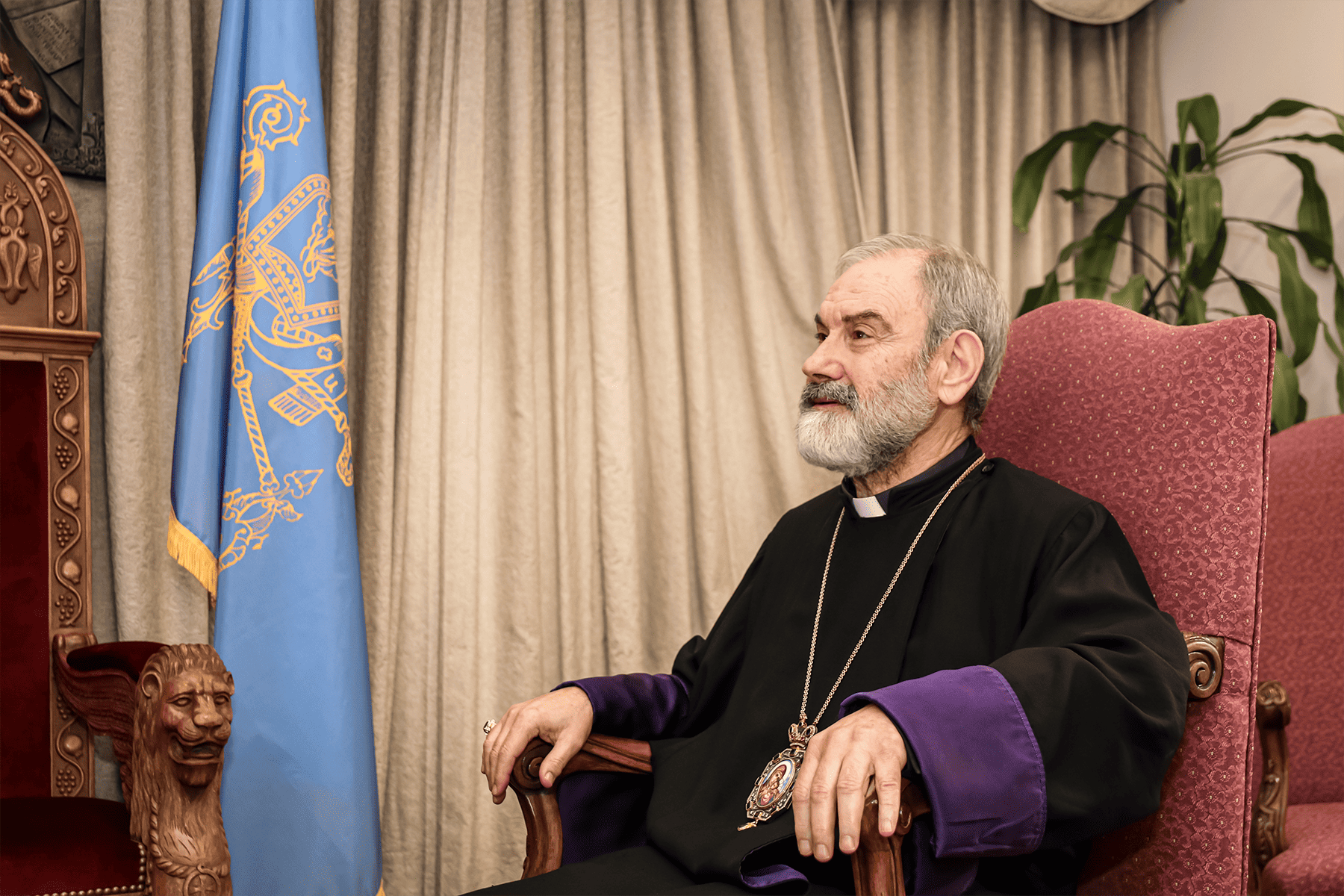Prelate looks back on pandemic and its impact on the Church in interview with Crossroads
Crossroads: Srpazan Hayr, looking back, can we say that the Church tackled the coronavirus pandemic challenges in its favor, beginning a new period of growth, creating new links with the faithful thanks to the technological resources?
Archb. Anoushavan: The Church, like her Founder, is called upon struggling against all evils and overcoming them with goodness. As in every historical era, also today, faced with a deadly challenge, it was able to successfully continue its service. Notwithstanding temporary changes in the traditional liturgy, the Church never strayed from its mission of evangelizing, spreading the good tidings and becoming a safe haven for tormented and troubled souls in the midst of the present crisis.
In this sense, it was confirmed once again that Faith and Science complement each other. Furthermore, technology became a splendid means to spiritually link up those who were physically separated.
Most likely, thanks to the online outreach, the virtual flock of the Eastern Prelacy grew beyond its jurisdiction. For example, the Prelacy today has followers in other states and countries. What do you think of this development?
You are right. Virtual outreach has opened a new dimension in our service. It wouldn’t be stretch to say that during the coronavirus pandemic, while disastrous, our eyes were also opened to new horizons to carry out evangelization and forge our identity. In the so-called pre-pandemic era, like every church, the Eastern Prelacy devoted its efforts to fulfill the spiritual and social needs of its local flocks. All our projects that were livestreamed, the Divine Liturgy, Praying with the People, Prayer for the Ill and the Deceased, Faith and Family, Reflections, Bible Study, conferences, programs for the youth and children, went beyond the limits of our districts and had a positive impact on our brothers and sisters even across the ocean. Parallel to the service to our immediate flock, this outreach effort has opened up a new, promising field for our evangelization work and the rebuilding of our identity, which I’m sure will continue to expand.
In this post-pandemic era, what are the problems the Church and the faithful face?
Without a doubt the programs mentioned above were a great blessing. The Eastern Prelacy and our Pastors, Parishes and related bodies, including all our sister organizations, spared no effort to minimize this mandatory isolation. According to the Aristotelian definition, however, as man is a social animal, he needs social life as much as air for breathing.
For all the positive impact of the new virtual programs, the blessings of social life are irreplaceable: the administration of Holy Communion, the collective benefits created by church, community and cultural events. All this forms part of our existence, as spiritual and rational beings. The glimmers of hope are being dispelled by the new, threatening waves of the pandemic, delaying the return to normal life and making us miss more deeply what has been lost.
On top of all this, with the tragedies that occurred in our Homeland and Artsakh as well as the Middle East, in particular the socio-economic and social crisis in Lebanon, the situation we are faced with has a potential for unexpected developments.
What message do you have for the faithful?
More than a message, I would like to share the wisdom that comes from the Bible and from the eventful life of our people.
The psalmist, while sharing with us the consternation of his personal life, he also makes us part of his realistic optimism when he says: “The pains of death surrounded me, and the pangs of Sheol laid hold of me; I found trouble and sorrow. Then I called upon the name of the Lord: ‘O Lord, I implore You, deliver my soul!’ Gracious is the Lord, and righteous; Yes, our God is merciful.” (Psalm 116:3-5)
When Hovhannes Tumanian sang, “Homeland of hope, homeland of light,” our people were surrounded by a deadly reality, drinking to the end from the bitter chalice of despair. Before this abyss of desperation, our immortal poet, full of Faith and steeped in a prophetic spirit, illuminated the Armenian sky with glimmers of Hope and Light.
And when we listen to the Armenian bard, his heartfelt message is, “Bad days come and go like winter, we don’t have to despair, they end, they come and go.”
There is no doubt whatsoever that the Armenian people, who have been fighting to preserve its God-given identity for five thousand years, will come out of this seemingly dead end in which finds itself in the first quarter of the 21st century, thanks to its natural crusading spirit, with Faith in the Resurrected, the Hope that is common to all saints and heroes, and mutual Love.

